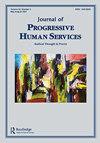Quizzing the ‘Social’ in Social Work: Social Work in Africa as a System of Colonial Social Control
IF 0.8
Q1 SOCIAL WORK
引用次数: 0
Abstract
ABSTRACT Social work is generally presumed as an embodiment of social justice and human dignity as well as a solution to the many social ills unraveling modern societies. However, a dialectical-historical investigation of forces and events that shaped social work in Africa reveals how the profession was produced within the dynamics of the modern capitalist system as a direct response to social challenges of the modern era with a prime object of maintaining social order and sustaining coloniality. Through critical interrogation of the question of the social, the article demonstrates how western social work as a colonial instrument in the form of a helping profession institutionalized the subjection of Africans through the systematic destruction of indigenous ways of solving problems and their replacement with alien and vaunted Euro-North American systems of psychosocial care. The article uncovers the underlying ethical indictment of western social work linked to its historic failure to embody and address the inherent and prevailing challenges of social and cognitive justice within itself. Thus, the article reaffirms the need to ‘work and research back’ to the African roots as a way of stemming the tide and addressing the coloniality embedded in social work and the devastating effects of coloniality on the African social fabric and its inherent systems of psychosocial support.社会工作中的“社会”问题:作为殖民社会控制系统的非洲社会工作
社会工作通常被认为是社会正义和人类尊严的体现,也是解决现代社会许多社会弊病的办法。然而,对塑造非洲社会工作的力量和事件的辩证历史调查揭示了该职业是如何在现代资本主义制度的动态中产生的,作为对现代社会挑战的直接回应,其主要目标是维持社会秩序和维持殖民主义。通过对社会问题的批判性质疑,文章展示了西方社会工作作为一种殖民工具,以一种帮助职业的形式,通过系统地破坏土著解决问题的方法,并用外来的和自夸的欧洲-北美社会心理护理系统来取代它们,如何使非洲人的奴役制度化。这篇文章揭示了西方社会工作潜在的伦理控诉,这与它在体现和解决自身内在和普遍的社会和认知正义挑战方面的历史性失败有关。因此,文章重申需要“工作和研究回到”非洲的根源,以此作为遏制这股潮流和解决社会工作中嵌入的殖民主义以及殖民主义对非洲社会结构及其固有的社会心理支持系统的破坏性影响的一种方式。
本文章由计算机程序翻译,如有差异,请以英文原文为准。
求助全文
约1分钟内获得全文
求助全文
来源期刊

Journal of Progressive Human Services
SOCIAL WORK-
CiteScore
3.20
自引率
8.30%
发文量
14
期刊介绍:
The only journal of its kind in the United States, the Journal of Progressive Human Services covers political, social, personal, and professional problems in human services from a progressive perspective. The journal stimulates debate about major social issues and contributes to the development of the analytical tools needed for building a caring society based on equality and justice. The journal"s contributors examine oppressed and vulnerable groups, struggles by workers and clients on the job and in the community, dilemmas of practice in conservative contexts, and strategies for ending racism, sexism, ageism, heterosexism, and discrimination of persons who are disabled and psychologically distressed.
 求助内容:
求助内容: 应助结果提醒方式:
应助结果提醒方式:


